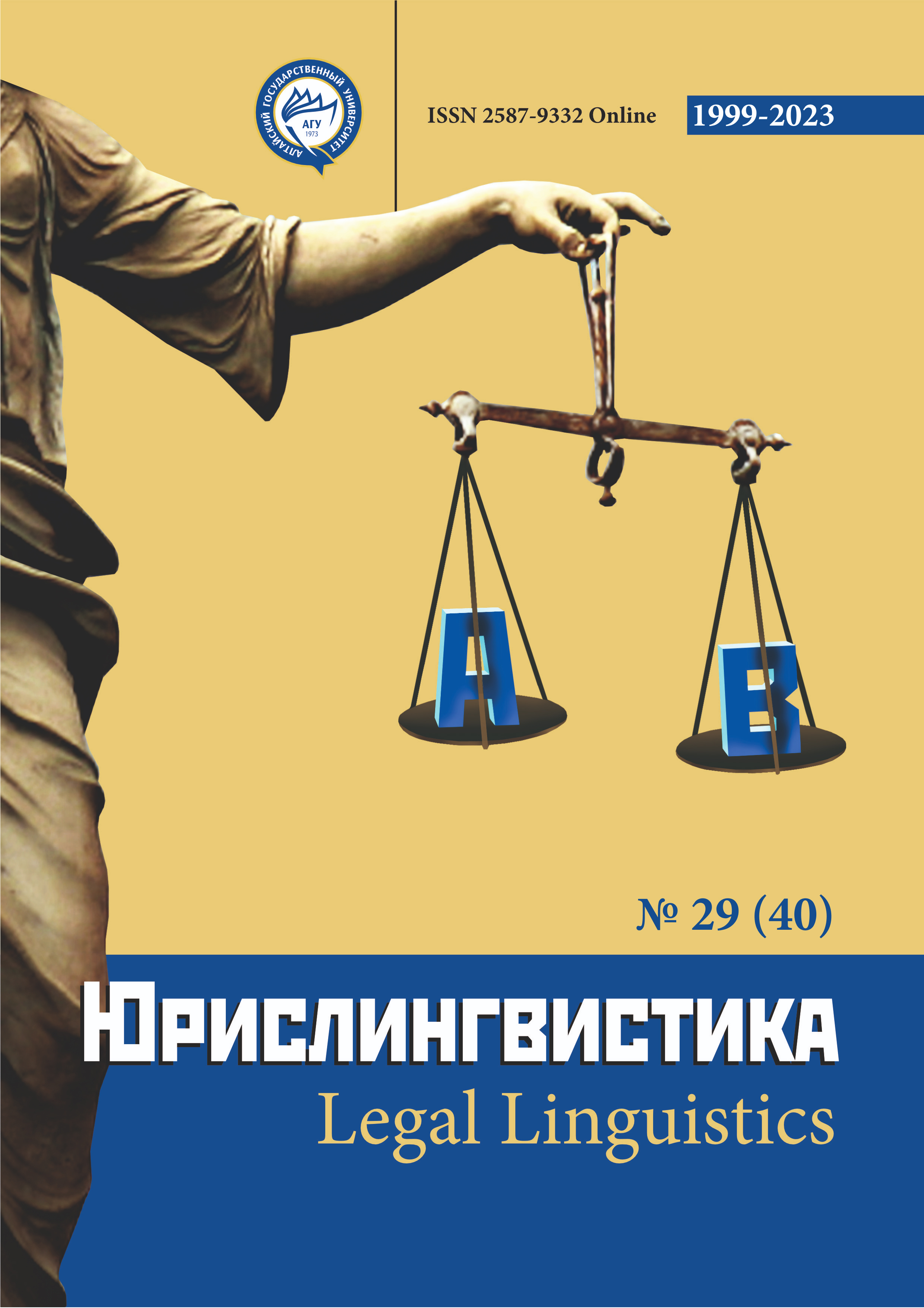Classification of Typical Tasks of Forensic Linguistics
УДК 343.148, ББК 67.53
Abstract
The main problem in forensic linguistic theory is the lack of an agreeable classification of expert tasks. Since the concept of expert task precedes concepts of method and methodology, it is clear that without regularizing tasks, further theoretical understanding of this subject area is impossible.
The purpose of our article is a theoretical revision of this topic. Definitions of the term "expert task" are specified, and bases for classifying tasks common to all kinds and types of forensic examination are listed. We've checked classification options found in modern methodological and teaching publications on forensic linguistics in Russian ("Semantic Research in Forensic Linguistic Expertise" by RFCFS of the Russian Ministry of Justice, textbook by prof. Elena Galyashina, manual by ECC of the Russian Ministry of Internal Affairs). We've evaluated their logical correctness and compliance with the criminalistic and philological scientific basis. The conclusion is made about the suitability of some and unsuitability of other options: it is better to use the classification proposed by ECC of the Russian Ministry of Internal Affairs (tasks on denotative, evaluative, illocutionary, and extralinguistic components of a speech object). We've also concluded that it is unproductive to classify forensic linguistic tasks on a substantive law basis (tasks in cases of extremism, cases of libel, cases of corruption crimes, etc.). Such an understanding of expert tasks leads to systematic work outside of expert competence, in the field of law: an expert linguist plays the role of a competent investigation officer.
Downloads
Metrics
References
Аверьянова Т. В. Судебная экспертиза. Курс общей теории. М., 2015.
Аверьянова Т. В., Белкин Р. С., Корухов Ю. Г., Россинская Е. Р. Криминалистика. М., 2020.
Бельская Н. С. Применение аналитико-описательных методов в решении сравнительных задач судебного лингвистического исследования речевых произведений / Вестник Томского государственного университета. - 2014. - № 381. - С. 5-10.
Галяшина Е. И. Судебная лингвистическая экспертиза: учебник. М., 2021.
Голев Н. Д. Правовое регулирование речевых конфликтов и юрислингвистическая экспертиза конфликтогенных текстов / Правовая реформа в Российской Федерации: общетеоретические и исторические аспекты: Межвузовский сборник статей. - Барнаул, 2002. - С. 110-123.
Зинин А. М., Майлис Н. П. Судебная экспертиза. Учебник. М., 2002.
Красса С. И. Методы судебной лингвистической экспертизы: практическая типология / Сборник научных трудов Sworld по материалам международной научно-практической конференции. - 2012. - Т. 40. - № 4. - С. 88-91.
Моисеева Т. Ф. Основы судебно-экспертной деятельности: Конспект лекций. М., 2016.
Назарова Т. В., Гримайло Е. А., Мамаев Н. Ю., Коршиков А. П., Ростовская А. В. Лингвистическая экспертиза: Лингвистическое исследование устных и письменных текстов / Типовые экспертные методики исследования вещественных доказательств. - М., 2010. - Ч. 1. - С. 243-292.
Плотникова А. М., Кузнецов В. О., Саженин И. И. и др. Семантические исследования в судебной лингвистической экспертизе: Методическое пособие. М., 2018.
Россинская Е. Р., Галяшина Е. И., Зинин А. М. Теория судебной экспертизы (Судебная экспертология): учебник. М., 2016.
Copyright (c) 2023 Елена Новожилова

This work is licensed under a Creative Commons Attribution 4.0 International License.
The authors, which are published in this journal, agree to the following conditions:
1. Authors retain the copyright to the work and transfer to the journal the right of the first publication along with the work, at the same time licensing it under the terms of the Creative Commons Attribution License, which allows others to distribute this work with the obligatory indication of the authorship of this work and a link to the original publication in this journal .
2. The authors retain the right to enter into separate, additional contractual agreements for the non-exclusive distribution of the version of the work published by this journal (for example, to place it in the university depository or to publish it in a book), with reference to the original publication in this journal.
3. Authors are allowed to post their work on the Internet (for example, in a university repository or on their personal website) before and during the review process of this journal, as this may lead to a productive discussion, as well as more links to this published work (See The Effect of Open Access).











